Latvian-born conductor Mariss Jansons (1943-2019) is habitually ranked among the world’s greatest and best conductors, bringing perfectionism, versatility, intensity, and passion to the stage. He was known for his rigorously prepared performances, always looking behind the notes to find what the composer wanted to express.
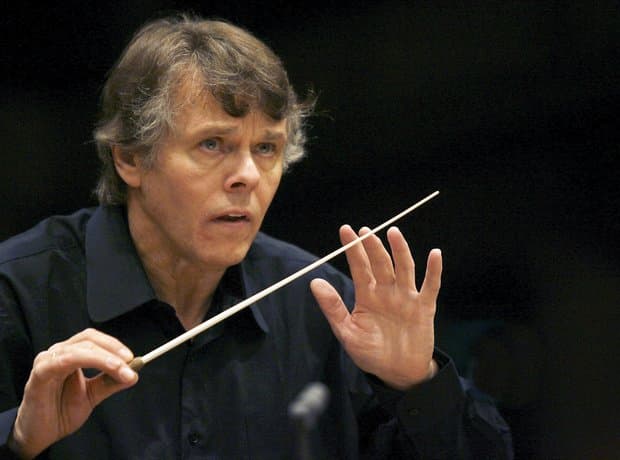
Mariss Jansons
According to Jansons, “Music takes you deeply into the human condition, and if it is performed well, it can be one of the most spiritually nourishing experiences imaginable.”
Jansons Conducts Mahler’s Symphony No. 2 “Finale”
Early Life
Mariss Jansons was born on 14 January 1943 under German occupation in the Latvian capital Riga. His father Arvīds Jansons was conductor of the opera orchestra, and his mother Iraida Jansons, the diva of the Riga Opera. His mother was Jewish, and had to give birth to her son in hiding after being smuggled out of the Riga Ghetto.
Since her father and brother had been murdered by the Nazis, she decided that her son would be a Lutheran, like his father. Jansons recalls, “My mother knew it was dangerous for me to be Jewish. In Soviet Riga you took your father’s culture and heritage.”
Jean Sibelius: Finlandia, Op. 26 (Oslo Philharmonic Orchestra; Mariss Jansons, cond.)
First Experiences
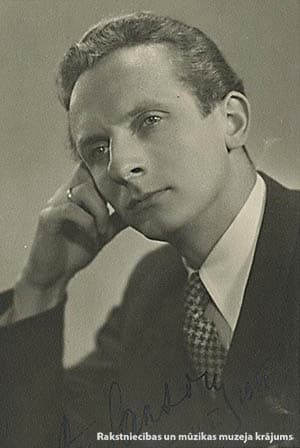
Arvīds Jansons
As Jansons explained in an interview, “I was always interested in music and conducting. My father was a conductor and my mother was a soprano. I spent so much of my early childhood in the opera house in Riga, where they worked. They didn’t like leaving me at home with a nanny. I soon knew all the ballets from memory and many operas. And it was the start of my fantasy: to play violin in someone’s theatre orchestra, or maybe to dance and, of course, to conduct.”
Jansons famously recreated performances he saw at the opera in a little toy theatre at home. Since he was an only child, he endlessly played with it and staged his own performances. As he recalled, “I’d make instruments out of two sticks, singing my way through music I’d heard. But I was already in effect studying conducting techniques, watching my father or his colleagues even when I was very small.”
Maurice Ravel: Rapsodie espagnole (Bavarian Radio Symphony Orchestra; Mariss Jansons, cond.)
Football or Music
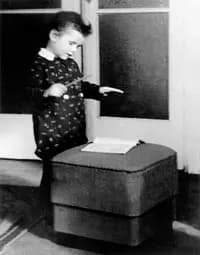
Mariss Jansons conducting at the age of 3
Around the age of six, Jansons started to seriously study piano and violin with his father, and a couple of years later he was talent spotted by a local football coach. One of the leading football coaches in Riga, he watched Mariss kick the ball around and approached his parents to ask if he could send their son to a specialist sports school.
As Jansons remembers, “They didn’t hesitate even for a second” and flatly turned down the request. “He will be a musician.” It seems that children born into the Jansons dynasty just didn’t have a choice. In 1956, his father was appointed assistant conductor to Mravinsky at the Leningrad Philharmonic, and Mariss joined his father in Leningrad.
Jansons Conducts Shostakovich’s Symphony No. 5, “Moderato”
Leningrad Conservatory
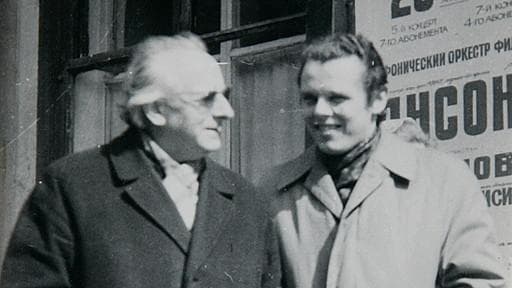
Father and Son Jansons
Jansons entered the famed Leningrad Conservatory in 1957 and studied conducting with Nikolai Rabinovich. For Mariss it was a completely new world. “I had to learn a new language, join a music school of extremely talented students, and carry on my ordinary studies.” As he explained, “I learned how to work very hard. My mentality completely changed and I developed this great sense of responsibility and seriousness about my music. I became a different person.”
It was common practice in Russia at that time that the child of a working man would follow in his father’s footsteps. However, “that was not the case if you came from the intelligentsia; there was always suspicion.” When Herbert von Karajan visited the Soviet Union in 1968 to conduct a masterclass, he singled out Jansons and offered him the opportunity to study with him in Berlin. Soviet authorities, however, refused permission.
Mariss Jansons Conducts Strauss’ Six songs for voice and orchestra
Karajan
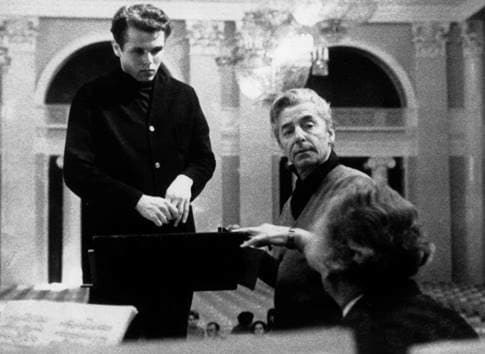
Mariss Jansons with Karajan
One year later, Jansons was accepted on an exchange program that allowed him to study in the West. He first furthered his training under Hans Swarowsky in Vienna, and subsequently shadowed Karajan at three Salzburg festivals. “I was with him from nine in the morning until 11 at night every day,” explained Jansons. “He was a great man with great ideas.. and he was like a bird flying in the air while the rest of us were on the ground. He seemed to be above it all, and he could see everything.”
For Jansons, Karajan was the greatest conductor who taught him never to be satisfied. Continuing to develop is “hard, hard work again and again and again work!” The fruit of all this hard labour is, according to Jansons, “to feed the spirit. We give too much attention to material things and technical progress, and we forget about our spiritual development and our evolution. Music certainly is the biggest help in times of great distress.”
For more of the best in classical music, sign up for our E-Newsletter
